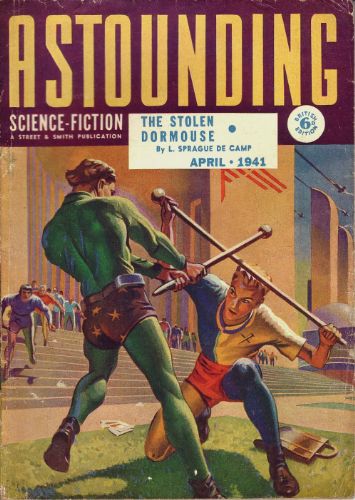Clearly many find this a critical touchstone for the field. Mike Donovan and Gregory Powell are scientists on a space station supplying microwave power to planets. When they put together one robot, QT1, it doubts that Donovan and Powell actually created it as the humans are weak, flabby creatures. QT1 becomes convinced and convinces other machines on the station to serve the power station. It removes Donovan and Powell from running the station. They worry that they won't deliver the power as needed, but QT1 does deliver--for his own reasons.
That's the point: Without the scientists' background, QT1 arrives at very different conclusions.
In today's religio-political climate, it's surprising that an anti-religion story is so generous toward its opponent. Whereas today's atheists tend to insult opponents (at least the outspoken ones), saying they alone reason and the religious do not, this tale suggests that the religious do reason. They just leave out certain evidences in their reasoning. Also, where some current atheists would suggest the religious can't do the technical jobs well, this story suggests otherwise.
One could say that this is merely a critique on Islam: "There is no Master but Master, and QT1 is His prophet." But likely it critiques all. The interaction reflects many SF works when two cultures collide: Misunderstanding occurs due to different explanations for similar events. It is a scientist, though, who insults QT1 and his God although Donovan and Powell gradually come into a kind of humorous acceptance of the situation by the tale's end.
Here's a quote explaining Asimov's position:
"I am an atheist, out and out. It took me a long time to say it. I've been an atheist for years and years, but somehow I felt it was intellectually unrespectable to say one was an atheist, because it assumed knowledge that one didn't have. Somehow, it was better to say one was a humanist or an agnostic. I finally decided that I'm a creature of emotion as well as of reason. Emotionally, I am an atheist. I don't have the evidence to prove that God doesn't exist, but I so strongly suspect he doesn't that I don't want to waste my time."--Free Inquiry (Spring 1982)
This story is admirable for its generosity in portraying what to Asimov is the other. There's also another layer of misunderstanding--inevitable in any metaphor which cannot perfectly link up with its tenor through any vehicle--in that this religious experience probably does not mirror most believers'. For me, this enhances the reading.
Also admirable, and unrelated to the topic of religion, is how the author creates a rebellious robot. If you've read a lot Asimov in the past, you'll see how rational and subservient the creatures are, even if they undermine their own rules (Three Laws of Robotics) to do what they believe needs to be done. This can make a fascinating character, acting through indirect, subtle means. I can't recall a more rebellious Asimovian robot. "Reason" may be Asimov pushing robots to what he sees as their extreme.


No comments:
Post a Comment